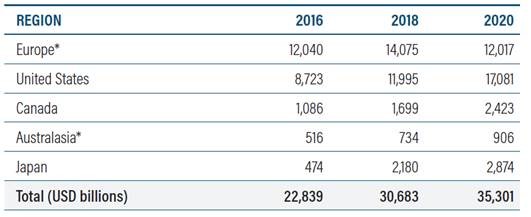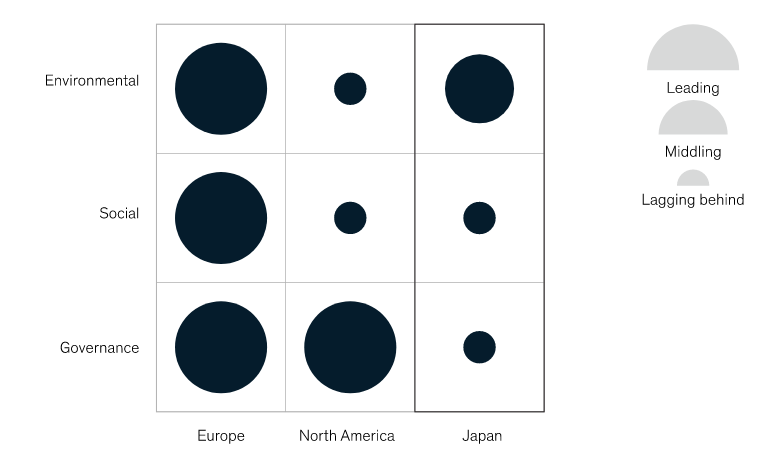Commentary
Japan: Land of the Rising ESG
July 22, 2021
Among companies globally, which country accounts for the highest percentage of companies that are over 100 years old? The answer is Japan, with about 33,000 companies at least a century old (approximately 40% of total companies). These companies tend to prioritize values such as commitment, quality, community, and tradition over financial logic.
Business longevity is one of the benefits of sustainability, a concept that is deeply rooted in Japan. Japanese culture also has a profound appreciation of nature. Corporations and individuals have a strong attachment to their community and wider society. Many companies promote lifelong employment, environmentally-friendly processes, product safety, and harmonious relationships among stakeholders.
Regarding ESG investing, a concept developed in Europe, Japan is a late starter, but has made impressive leaps thanks to joint efforts from the government, the financial regulator, and key market players. According to the Global Sustainable Investment Review 2020, Japan’s sustainable assets increased by 34% from 2018, six times the 2016 level, now standing at US$2.9 trillion.
Global Sustainable Investment Assets


Japan’s ESG journey officially started in 2014 when it adopted a Stewardship Code to encourage investors to promote sustainable returns and growth by using shareholder voting and engagement. In 2015, Japan issued its first Corporate Governance Code. In the same year, its Government Pension Investment Fund (GPIF) became a signatory to the Principles for Responsible Investment (PRI). GPIF, the largest pension fund in the world, started investing in ESG assets in 2017. As of March 31, 2020, it had 151 trillion yen (US$ 1.37 trillion) in total assets under management (all with ESG integration), of which 5.7 trillion yen (US$ 52 billion) was invested in tracking ESG indexes and 440 billion yen (US$3.6 billion) in green bonds.
In October 2020, Japan pledged to achieve carbon neutrality by 2050. A month later, the Japanese House of Representatives and the House of Councilors declared a climate emergency, indicating that tackling climate change is not a partisan issue. We believe such policy continuity builds a solid foundation for Japan to execute its Green Growth Strategy.
Currently, Japan’s ESG performance is lagging behind Europe and North America. McKinsey assessed the ESG performance of 621 companies in Europe, Japan, and North America from 2019 to 2020, based on 120 third-party ESG indicators, from carbon emissions to community relations to shareholders’ rights.
ESG Performance (Large and Smaller Companies Combined)

We believe the above results are more or less expected, considering Japan’s late start. The good news is that from governments to corporations, the topic of ESG is now front and center.
In a recent survey conducted by the GPIF, the 6th annual survey of Japanese listed companies regarding institutional investors’ stewardship activities, the results showed continuous progress in ESG activities.
- Many companies pointed out the following common issues as the major themes in their ESG activities: corporate governance (71.7%), climate change (63.6%), and diversity (43.2%).
- Themes that surpassed the ratio in the previous survey include climate change (+9.7%), health and safety (+8.0%), and environmental opportunities (+3.8%).
- Companies are more proactively working on information disclosure, not only through integrated reports, but also through new disclosure criteria, such as the Task Force on Climate-related Financial Disclosures (TCFD); 31% of respondents have endorsed the TCFD.
Japan has been making regular revisions to strengthen the ESG guidelines. Last April, a new proposal was published by the Council of Experts regarding the revision of Corporate Governance Code and Guidelines for Investor and Company Engagement. We are glad to see more stringent guidelines than before to enhance board independence, diversity, ESG reporting and many other areas. Japan is also expected to announce its 6th basic energy plan to lay out details towards carbon neutrality.
As a long-term investor in Japan, we’ve definitely witnessed companies improving ESG practices since 2015. With many new initiatives coming, we believe Japanese companies have great potential to improve their ESG practices and create more value.







